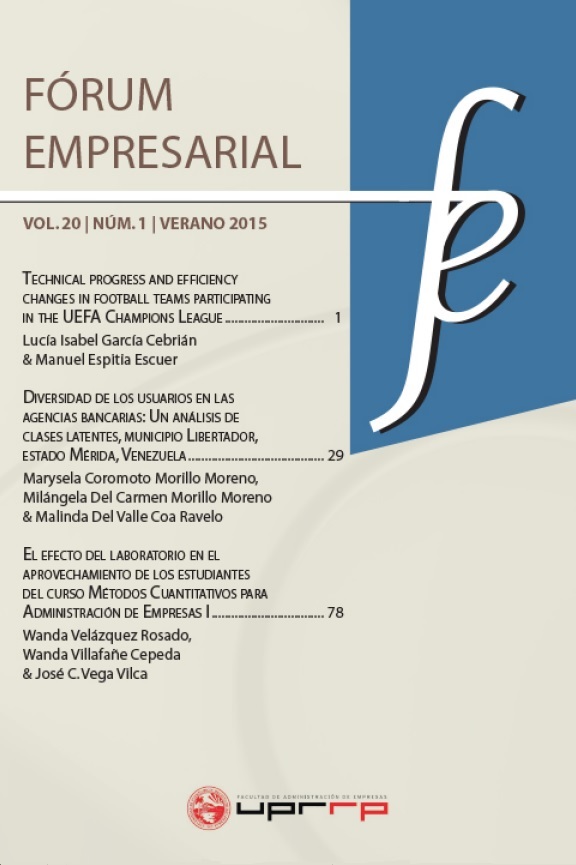Abstract
This paper commits to calculate and analyze productivy levels and its components for teams that participated in the UEFA Champions League between 2003 and 2012. It will pursue three objectives: 1) evaluate resources usage, 2) analyze the productivity levels of the football teams and the sports results, and 3) see the influence of participation experience in reference to productivity and sports results. Using Malmquist Productivity Index, the results reflect a lack of consistent progression of efficiency, productivity, and technical change. This competition does not reward the efficient usage of resources and there is not a conclusive relationshop between permanence in the competition and productivity.References
Brook, S. (2005). What do sports teams produce? Journal of Economic Issues, 39(3), 792-797.
Carmichael, F., & Thomas, D. (1995). Production and efficiency in team sports: An investigation of rugby league football. Applied Economics, 27(9), 859-869.
Carmichael, F., Thomas, D., & Ward, R. (2000). Team performance: The case of English premiership football. Managerial and Decision Economics, 21(1), 31-45.
Chen, Y., Cook, W. D., & Zhu, J. (2010). Deriving the DEA frontier for two-stage processes. European Journal of Operational Research, 202, 138-142.
Cook, W. D., Tone, K., & Zhu, J. (2014). Data envelopment analysis: Prior to choosing a model. Omega, 44, 1-4.
Dawson, P., Dobson, S., & Gerrard, B. (2000). Stochastic frontiers and the temporal structure of managerial efficiency in English soccer. Journal of Sports Economics, 1(4), 41-362.
Despotis, D. K. (2002). Improving the discriminating power of DEA: Focus on globally efficient units. Journal of the Operational Research Society, 53(3), 314-323.
Farrell, M. J. (1957). The measurement of productive efficiency. Journal of the Royal Statistical Society, 120(Part III), 253-421.
Golany, B., & Roll, Y. (1989). An application procedure for DEA. Omega, 17(3), 237-250.
Grosskopf, S. (1993). Efficiency and productivity. In H. O. Fried, C. A. K. Lovell, & S. S. Schmidt (Eds.), The measurement of productive efficiency (pp. 160-194). Oxford University Press.
Hadley, L., Poitras, M., Ruggiero, J., & Knowles, S. (2000). Performance evaluation of national football league teams. Managerial and Decision Economics, 21(2), 63-70.
Kao, C., & Huang, S. N. (2008). Efficiency decomposition in two-stage data envelopment analysis: An application to non-life insurance companies in Taiwan. European Journal of Operational Research, 185, 418-429.
Kao, C., & Huang, S. N. (2011). Decomposition of technical and scale efficiencies in two-stage production systems. European Journal of Operational Research, 211, 515-519.
Keh, H. T., & Chu, S. (2003). Retail productivity and scale economies at the firm level: A DEA approach. Omega, 31, 75-82.
Lewis, H. F., Lock, K. A., & Sexton, T. R. (2009). Organizational capability, efficiency, and effectiveness in Major League Baseball: 1901-2002. European Journal of Operational Research, 197, 731-740.
Lovell, C. A. K., Walters, L. C., & Wood, L. L. (1994). Stratified models of education production using modified DEA and regression analysis. In A. Charnes, W. Cooper, A. Y. Lewin, & L. M. Seiford (Eds.), Data envelopment analysis: Theory, methodology and application (pp. 329-351). Springer, Netherlands: Kluwer Academic Publishers.
Medina-Borja, A., & Triantis, K. (2011). Modeling social services performance: A four-step DEA approach to evaluate fundraising efficiency, capacity building, service quality and effectiveness in the non profit sector. Annals of Operations Research, DOI 10.1007/s10479-011-0917-0.
Neale, W. C. (1964). The peculiar economics of professional sports. A contribuion to the theory of the firm in sporting competition and in market competition. Quarterly Journal of Economics, 78(1), 1-14.
Rottenberg, S. (1956). The baseball players‘ labor market. Journal of Political Economy, 64, 242-258.
Schofield, J. A. (1988). Production functions in the sports industry: An empirical analysis of professional cricket. Applied Economics, 20(2), 177-193.
Sexton, T. R., Silkman, R. H., & Hogan, A. J. (1986). Data envelopment analysis: Critique and extensions. In R. H. Silkman (Ed.), Measuring efficiency: An assessment of data envelopment analysis, (pp. 73-105). [San Francisco, CA:] Jossey-Bass.
Sexton, T. R., & Lewis, H. F. (2003). Two-stage DEA: An application to major league baseball. Journal of Productivity Analysis, 19, 227-249.
Triantis, K. P. (2004). Engineering applications of data envelopment analysis. Issues and opportunities. In W. W. Cooper, L. M. Seiford, & J. Zhu (Eds.), Handbook on Data Envelopment Analysis, (pp. 401-441). [Boston, MA:] Kluwer Academic Publishers.
By submitting a contribution to consideration of the Editorial Board of Fórum Empresarial, the authors attest that it is an original, unpublished work, which has not been nor will be simultaneously submitted to another journal for consideration and publication; that they are responsible for the work carried out and the content of the article; and they have the corresponding copyrights.
The authors grant the right of first publication of their work to Fórum Empresarial, in any medium and physical and electronic format, including internet. Publication shall be subject to the Creative Commons Attribution-NonCommercial 4.0 International License, which allows third parties to share the work, provided that the author and Fórum Empresarial (as a first publication) are cited.
The journal allows authors to retain publishing rights without restrictions. Authors are able to enter into separate, additional arrangements for the non-exclusive distribution of the journal's published version of the work (e.g., post it to an institutional repository or publish it in a book), with an acknowledgment of its initial publication in Fórum Empresarial.

